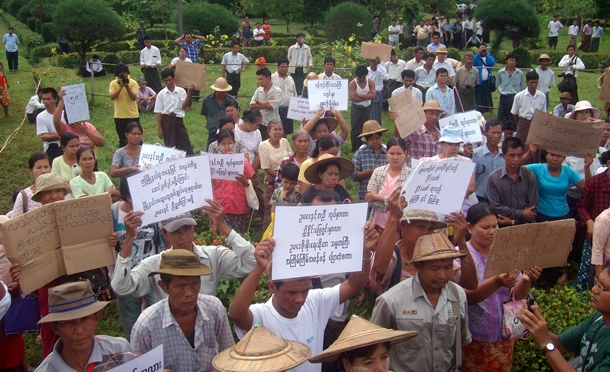RANGOON — Human Rights Watch (HRW) and Burmese civil society organizations have urged the World Bank Group to put human rights at the center of its new Burma country strategy.
They said the bank should encourage an improvement in respect for rights within the Burmese government, while also ensuring that its development projects do not exacerbate ethnic conflict and the land rights’ situation.
Burmese officials are scheduled to meet with World Bank President Jim Kim in Washington on Oct 10-12 as part of the bank’s preparation for a five-year country strategy for Burma.
The New York-based HRW sent a submission with suggestions regarding the strategy on Friday, while a group of about 40 Burmese NGOs sent their submission late last month.
“World Bank Group President Jim Kim should highlight ongoing problems of discrimination and abuses against ethnic minorities, land and labor rights, access to justice, and corruption when he meets with Burmese finance officials,” HRW said in a statement.
The group said the bank should be raising its concerns over the plight of the Rohingya Muslims in western Burma, a stateless minority of around 1 million people who suffer severe rights violations and a range of restrictions at the hands of authorities and local security forces.
“World Bank Group President Jim Kim has highlighted the cost of discrimination not only on society, but on the economy,” said Jessica Evans, HRW’s senior international financial institutions researcher. “Kim should emphasize these costs with Burma’s government and urge them to dismantle entrenched discrimination and take the necessary measures to end the violence against the Rohingya and other Muslim communities.”
The World Bank and the International Finance Corporation (IFC), both part of the World Bank Group, resumed operations in Burma in 2012 after President Thein Sein introduced political reforms.
Like the International Monetary Fund and the Asian Development Bank, the World Bank Group provides the government with loans, grants and technical support, and implements developmengt projects with the aim of reducing poverty and achieving sustainable development.
HRW said the bank should do more to ensure that local communities can participate in identifying and shaping development priorities of the government and the bank.
A group of 39 local NGOs working on human rights, social and environment issues warned the World Bank against implementing projects that would worsen ethnic conflict and Burma’s deteriorating land rights situation.
The bank should implement “a sector-wide analysis of the drivers, institutions and dynamics that perpetuate conflicts such as the militarization of resource-rich areas that are mostly populated by ethnic communities, capture of the legislative, judicial and executive branches of the government by the military and their cronies,” they said.
The group, which included prominent NGO alliances such as the Burma Partnership, Paung Ku and the Myanmar Alliance for Transparency and Accountability, also called for the bank to conduct a comprehensive land rights survey as part of its new country strategy as “[l]and-grabs are almost universally identified as the most widespread human rights abuse” in Burma.

















